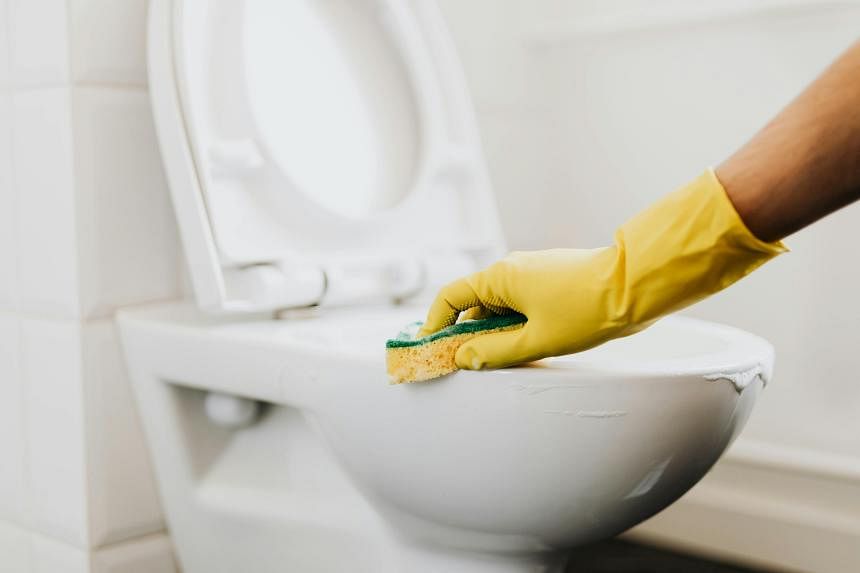Coffee shop toilets found to be dirtiest in SMU study of 2,600 public loos
Coffee shop toilets have consistently scored low marks since an islandwide study of public toilets began in 2016.
Feb 03, 2025
SINGAPORE – The cleanliness of coffee shop toilets here has not improved over the years despite the authorities imposing stiff penalties for lapses, according to an islandwide study of public toilets by the Singapore Management University (SMU).
Coffee shop toilets performed the worst, with a score of just 46.26 out of 100.
Hawker centre toilets fared better, with a score of 66.28, while toilets in shopping malls fared the best, scoring 77.01. MRT station toilets performed second best, with a score of 75.97.
The results of the study were released in late December 2024.
Conducted between August and September 2024, the study looked at 2,602 public toilets in 1,428 coffee shops, hawker centres, MRT stations and shopping malls in Singapore.
The team behind the study, led by SMU statistics principal lecturer Rosie Ching and comprising more than 200 undergraduates, visited the toilets to check them using 17 criteria. The criteria included the cleanliness of toilet bowls and sinks, as well as the availability of soap and toilet paper.
Out of all toilets surveyed, the study found below-acceptable standards for 14 attributes, with clogged sinks, dirty toilet bowls and insufficient ventilation being frequent complaints.
“Cleaning schedules were often outdated or entirely absent, with only taps, sinks and soap achieving reasonable ratings,” SMU said in a release.
Coffee shop toilets have consistently scored low marks, hovering at around 46 points, since the study – which was conducted in 2016, 2020, 2023 and 2024 – began.
One concern is the proximity of cooking facilities to dirty toilets in coffee shops and hawker centres, said Ms Ching, noting this suggested a correlation between the two.
“We found that these toilets – the toilets in close proximity to kitchens – rank very lowly on the toilet cleanliness index,” she said.
Photographs of these toilets would “make anyone’s appetite vanish in an instant”, she added.
Dirty toilets pose health risks such as the spread of gastrointestinal infections like salmonella.
The study looked at 2,602 public toilets in 1,428 coffee shops, hawker centres, MRT stations and shopping malls in Singapore.
PHOTO: LIANHE ZAOBAO FILE
As part of the study, 4,905 people – 510 employees and 4,395 customers – were interviewed for insights into “perceptions of toilet cleanliness”.
Almost half of the respondents said they were willing to pay to use public toilets if their cleanliness could be guaranteed.
Of those who were willing to pay, 82 per cent said they were open to paying between 10 cents and 30 cents, with 42 per cent even willing to fork out 50 cents to over $1 for a spotless experience.
While the toilets at coffee shops, which are privately run, are generally free to use, some town councils impose fees to use the toilets at certain hawker centres.
Though 42 per cent of respondents attributed dirty public toilets in coffee shops and hawker centres to “irresponsible users”, Ms Ching said the onus of ensuring their cleanliness is on their operators.
Noting an overlap in users among toilets in various locations, she said this suggested the main difference was in operators’ efforts in keeping toilets clean.
Ms Ching suggested that a rating system for public toilets – similar to the Singapore Food Agency’s (SFA) Safety Assurance for Food Establishments framework for eateries – could help ensure their cleanliness.
Speaking to The Straits Times, World Toilet Organisation founder Jack Sim noted that only 44 coffee shops out of more than 1,000 islandwide had signed up for the year-long Toilet Improvement Programme, which was rolled out in October 2020.
The programme provides up to 90 per cent co-funding, capped at $45,000, for coffee shop owners or operators to improve toilet design, install sanitary fittings or adopt technology to facilitate the cleaning and maintenance of toilets in coffee shops.
Mr Sim suggested that operators of dirty toilets could be publicly named and shamed to encourage cleanliness.
ST has contacted coffee shop associations here for comment.
Over the past year, the authorities have stepped up efforts to improve the cleanliness of public toilets.
In 2024, the SFA suspended 10 coffee shops for toilet-related and food safety offences under the Points Demerit System, compared with just one suspension each in 2022 and 2023.
This was in addition to the SFA and National Environment Agency (NEA) taking more than 1,200 enforcement actions, such as fines and warnings, against owners of premises in 2024 over a lack of public toilet cleanliness – up from over 360 the previous year.
In November 2024, the Cleaner Public Toilets Campaign was launched by the NEA and the Public Hygiene Council.
Meanwhile, the Public Toilets Task Force – chaired by Senior Parliamentary Secretary for Sustainability and the Environment Baey Yam Keng – is looking into providing operators with more resources to help build and better maintain their toilets, while also exploring ways to encourage them to upgrade their toilets more frequently.
Staying clean in public toilets
Some simple practices can help you stay clean when using the toilet.
Close the toilet bowl lid when flushing
Closing the toilet bowl lid when flushing can help stop the spread of faecal bacteria. A study by researchers from the Leeds Teaching Hospitals in Britain, published in the Journal Of Hospital Infection in 2012, found that flushing with the lid up can spray diarrhoea-causing bacteria by as much as 25cm above the toilet seat.
Wash your hands
It may be common sense, but one study, published in the International Journal of Epidemiology in 2019, estimated that only about 26 per cent of people worldwide wash their hands with soap after potential “faecal contact” in restrooms. Washing your hands thoroughly after using the toilet can help prevent a range of diseases, such as influenza and hand, foot and mouth disease.
Refrain from using your phone in the toilet
Not using your phone while in the restroom could prevent diseases. A 2011 study, conducted by researchers from the London School of Hygiene and Tropical Medicine and the Queen Mary University of London, suggested that as many as one in six mobile phones in Britain was contaminated with faecal matter containing the E. coli bacterium, which can cause vomiting and diarrhoea.











